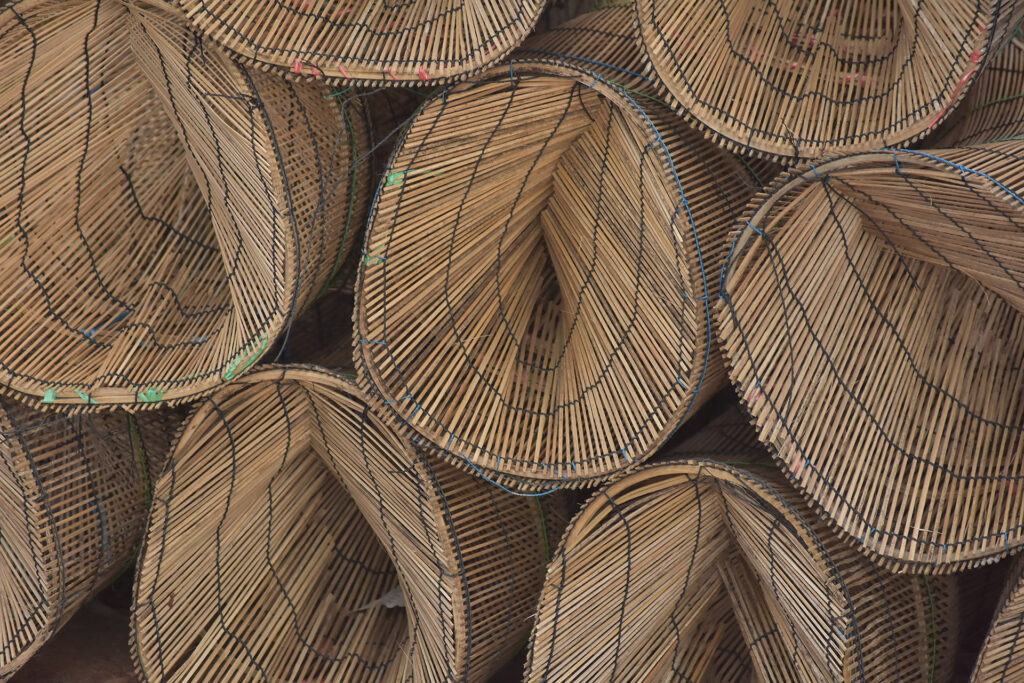
At Dream Consultancy Limited, we’re dedicated to promoting sustainable aquaculture practices that honor both environmental preservation and cultural heritage. In this article, we take a closer look at traditional fish harvesting tools, specifically bamboo traps, widely used in Bangladesh’s rural fishing communities. These tools represent a blend of ingenuity, sustainability, and deep-rooted cultural significance, which makes them invaluable to both the community and the environment.
The bamboo fish traps seen in Bangladesh are crafted by skilled artisans who often learn the techniques passed down through generations. Each trap is meticulously woven from bamboo strips, embodying the heritage and traditional knowledge of local communities. This craft not only preserves cultural identity but also offers a livelihood to artisans, linking economic resilience to cultural heritage. By promoting the use of these traps, we help safeguard the knowledge and traditions of communities who have practiced sustainable fishing for centuries.
Unlike modern fishing tools that can sometimes harm the environment, bamboo fish traps are designed to work harmoniously with nature. Made from biodegradable bamboo, these traps naturally decompose over time, leaving no lasting impact on aquatic ecosystems. Additionally, they capture fish selectively, reducing bycatch and preserving biodiversity. At Dream Consultancy Limited, we champion these tools because they support responsible fishing practices that minimize ecological disruption.
For small-scale fishers, affordability is key. Modern fishing equipment can be expensive, creating barriers for low-income communities. Bamboo traps, however, are cost-effective and accessible, empowering fishers with limited resources to sustain their livelihoods. These traps are easy to make, maintain, and repair, providing fishers with an affordable, self-sustaining solution that requires no external power or fuel. This accessibility is crucial in supporting local economies and ensuring that the benefits of fishing are widely shared.
One of the biggest advantages of bamboo traps is their compatibility with natural resource conservation. When used properly, these traps help maintain fish populations, ensuring that resources are not overexploited. Fishers place traps strategically to capture only mature fish, allowing younger fish to grow and reproduce. This method contributes to sustainable fishery management by respecting the natural lifecycle of fish species, which is increasingly vital as we face rising pressures on aquatic resources.
Traditional fish harvesting tools foster a sense of self-reliance in rural communities. By using locally available materials like bamboo, communities become less dependent on imported or costly materials. This resilience is especially important in times of economic uncertainty, where access to resources may be limited. At Dream Consultancy Limited, we believe that empowering communities with the means to support themselves builds social and economic resilience, contributing to the broader goals of sustainable development.
The use of traditional fish traps provides an excellent educational opportunity for younger generations. As part of community education, these tools showcase the benefits of sustainable practices, instilling environmental stewardship in future generations. By encouraging young people to learn and respect these traditional methods, we nurture a culture of sustainability that extends beyond aquaculture. Dream Consultancy Limited envisions these educational efforts as a means to inspire broader environmental consciousness in aquaculture and beyond.
While bamboo traps are rooted in tradition, they can also be integrated into modern aquaculture systems. By studying their efficiency and environmental benefits, researchers and aquaculture experts can find innovative ways to adapt traditional methods for modern needs. For instance, combining these traps with advanced fish tracking techniques can enhance productivity without sacrificing sustainability. At Dream Consultancy Limited, we strive to bridge traditional knowledge with modern innovation, creating hybrid solutions that are both effective and eco-friendly.
Finally, bamboo fish traps symbolize a harmonious relationship with nature, where people take only what they need while allowing ecosystems to thrive. These tools are reminders that sustainable practices don’t always require high-tech solutions; sometimes, the best methods are those that have stood the test of time. The traps represent an understanding of natural rhythms, inspiring us at Dream Consultancy Limited to prioritize balance and respect for nature in all our projects.
Traditional bamboo fish traps are more than just tools; they are symbols of sustainability, resilience, and cultural pride. At Dream Consultancy Limited, we’re committed to promoting practices that honor this heritage while encouraging sustainable fisheries. As we navigate the complexities of modern aquaculture, we continue to learn from these simple yet profound tools that embody harmony between humans and nature. By preserving and promoting these practices, we aim to build a future where both communities and ecosystems thrive.
In conclusion, bamboo fish traps offer lessons in sustainability, affordability, and respect for natural resources. As we celebrate and elevate these traditional methods, Dream Consultancy Limited encourages everyone in the aquaculture community to recognize the value of heritage-driven practices in creating a balanced and sustainable world.